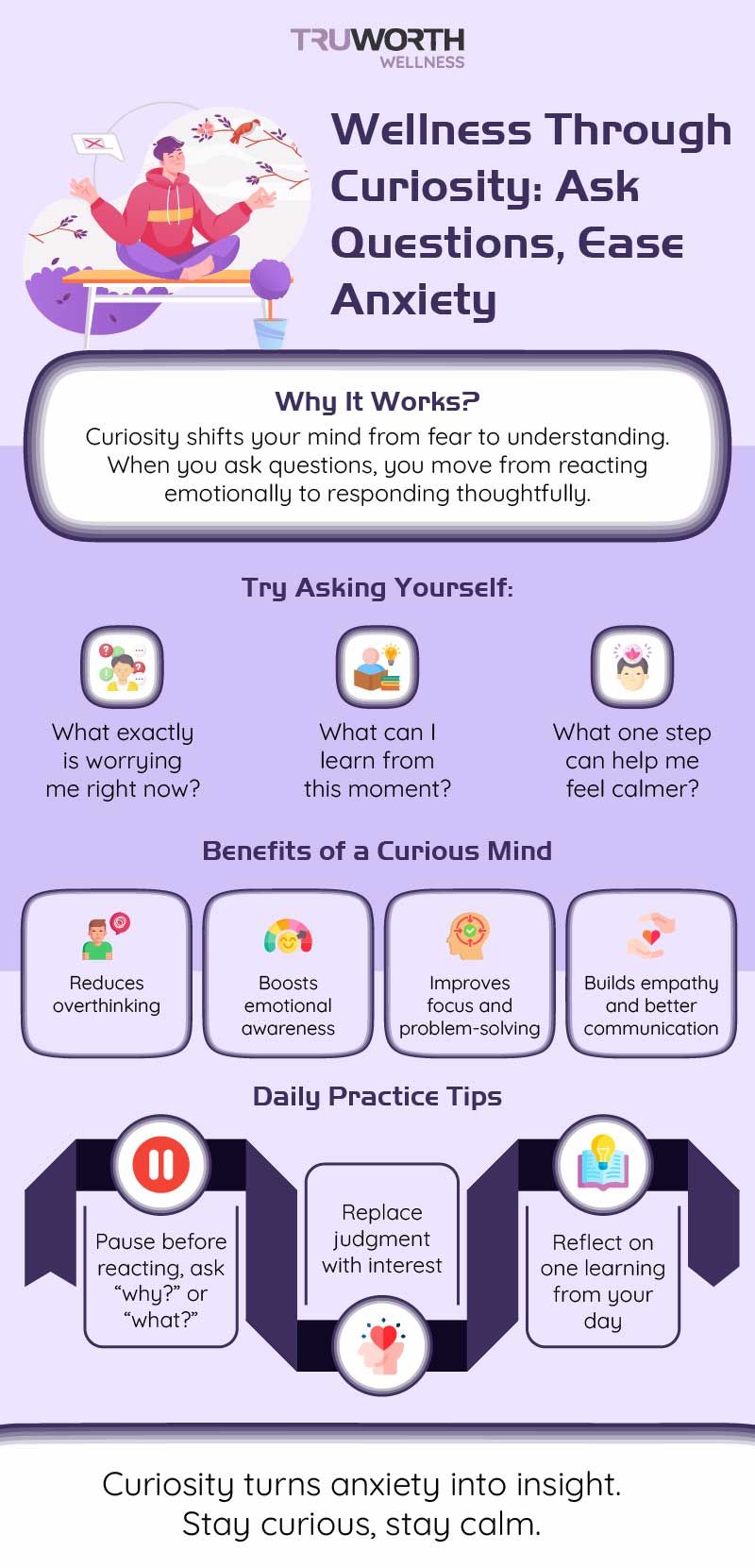Wellness Through Curiosity: Why Asking Questions Can Lower Anxiety?

Where uncertainty and constant change are part of daily life, anxiety has quietly become a common emotional companion. Employees juggle deadlines, expectations, and evolving work cultures, often feeling the weight of “what ifs” and “what next.” While traditional ways to manage anxiety often focus on calming techniques or distraction, there’s an often-overlooked yet highly effective emotional skill that can make a difference: curiosity.
When we learn to be curious about our emotions instead of judging or fearing them, we give ourselves a new way to understand what’s going on inside us. Asking questions, exploring our feelings, and seeking clarity can turn anxious moments into opportunities for insight and growth.

The Connection Between Curiosity and Anxiety
Anxiety thrives in uncertainty. When something feels unclear, our brain automatically starts imagining potential threats or failures. This is part of our body’s natural defense system. However, curiosity works like a mental counterbalance. Instead of running away from uncertainty, curiosity encourages us to explore it.
When you approach your worries with curiosity, you transform anxiety from a signal of danger into a signal for learning. For example, rather than thinking, “What if I make a mistake during this meeting?” you can shift to asking, “What can I learn from this experience?” or “What can help me feel more prepared?” This simple shift moves your mindset from fear to discovery.
Curiosity changes the emotional tone of an experience. It transforms nervous energy into interest, and interest gives your brain a sense of control. The more curious you become, the less space there is for anxious overthinking.
How Curiosity Impacts the Brain?
Anxiety activates the brain’s threat response, releasing stress hormones such as cortisol and adrenaline. These hormones prepare the body to either confront or escape a perceived threat. But when curiosity steps in, it activates a different part of the brain, the prefrontal cortex, which is responsible for reasoning, planning, and problem-solving.
In simple terms, curiosity helps you think more clearly. It allows your brain to switch from reacting emotionally to responding thoughtfully. This shift in brain activity not only calms you down but also helps you see your situation with greater perspective.
Over time, people who consciously practice curiosity find that they recover from stress faster, think more creatively under pressure, and feel less consumed by uncertainty.
The Power of Asking the Right Questions
Being curious does not mean endlessly analyzing your worries. It means exploring them with gentle interest. Questions such as “Why am I feeling this tension?” or “What is this situation trying to teach me?” help you connect with your emotions instead of ignoring or fighting them.
Often, anxiety is a signal from the body or mind asking for attention. It may mean you need more rest, reassurance, or clarity. By asking questions, you uncover these hidden needs before they grow into major stressors. This approach promotes emotional awareness and helps you manage challenges more skillfully.
Curiosity also encourages self-compassion. When you become curious about your emotions, you naturally move away from harsh self-criticism. Instead of thinking “I shouldn’t feel this way,” you begin to ask “What might be causing this feeling?” That small shift replaces judgment with understanding, a key factor in emotional wellness.
Curiosity Strengthens Relationships at Work
Curiosity is not only an internal strength but also a social one. In a workplace setting, being curious about others’ perspectives can greatly reduce anxiety caused by misunderstandings or assumptions. When communication feels unclear or tense, asking open-ended questions like “Can you help me understand your point of view?” fosters trust and collaboration.
A curious employee listens more and assumes less. This creates a more supportive work environment where people feel seen and heard. Over time, curiosity-driven communication enhances team harmony, reduces workplace stress, and encourages problem-solving.
It also improves empathy. When you are curious about why someone behaves a certain way, you start to understand their background and pressures rather than jumping to conclusions. This emotional insight helps reduce interpersonal anxiety and conflict.
How Communication Bias Affects Corporates: What You Don’t See Could Be Hurting You?
Curiosity as a Mindfulness Practice
Curiosity and mindfulness are closely related. Both involve being present and observant without judgment. When you feel anxious, you can turn curiosity into a mindfulness tool by asking simple questions about your experience.
For instance, when anxiety shows up before a presentation, pause and ask yourself:
- What is my mind trying to protect me from right now?
- Which part of this situation feels uncertain to me?
- What small step can I take right now to feel more prepared or confident?
These questions interrupt anxious spirals and bring your attention back to the present. Instead of letting your thoughts race into “what if” scenarios, you focus on what you can do in the moment. This awareness creates a sense of calm and control.
Building a Curious Mindset in Daily Life
Developing curiosity takes practice, but it can easily become a daily wellness habit. Small steps can rewire your thinking and help you respond to stress more positively.
Here are some simple ways to begin:
- Pause before reacting. The next time something stresses you out, take a moment to ask yourself, “What exactly is making me uncomfortable right now?”
- Replace judgment with interest. Instead of saying, “This is too difficult,” reframe it as “What can I learn from this challenge?”
- Be curious about others. Ask your colleagues how they handle pressure or what strategies work best for them. These conversations not only help you learn but also build stronger bonds at work.
- Reflect regularly. At the end of the day, ask yourself, “What went well today?” and “What can I do differently tomorrow?” This reflection builds awareness and helps you grow from daily experiences.
Practicing these habits consistently trains your brain to approach challenges with curiosity instead of fear. Over time, curiosity becomes a natural stress buffer that helps you stay calm, flexible, and open-minded.
The Broader Impact of Curiosity on Well-Being
Curiosity does more than reduce anxiety; it enhances your overall sense of well-being. People who cultivate curiosity tend to be more optimistic, resilient, and emotionally balanced. They are more likely to view setbacks as opportunities rather than failures.
At work, curiosity fuels innovation and adaptability. Teams that ask “why” and “what if” are better at solving problems creatively and navigating uncertainty. On a personal level, curious individuals tend to experience more satisfaction and engagement in both their professional and personal lives.
Curiosity also strengthens mental flexibility. When you are curious, you’re more open to new information and diverse viewpoints. This openness helps reduce the rigidity that often comes with anxious thinking. Instead of seeing situations as threatening, you start viewing them as interesting and full of possibility.
The Takeaway
Anxiety thrives on unanswered questions, while curiosity thrives on asking them. When you choose to explore rather than avoid, you replace fear with understanding. Each question you ask, whether about yourself, your emotions, or your environment, becomes a step toward clarity and calm.
Curiosity is not about having all the answers; it’s about being open to discovering them. It helps you respond to life’s uncertainties with calm awareness instead of automatic fear. In the process, it builds resilience, emotional intelligence, and a deeper connection with yourself and others.
So the next time anxiety starts to rise, pause for a moment and ask your mind a question. You might find that the simple act of being curious transforms worry into wisdom.
For deeper guidance on managing workplace anxiety and building long-term emotional resilience, connect with certified wellness professionals through tech-enabled platform by Truworth Wellness. Personalized consultations can help you understand your triggers and discover effective, science-backed strategies for staying calm and balanced in your daily life.